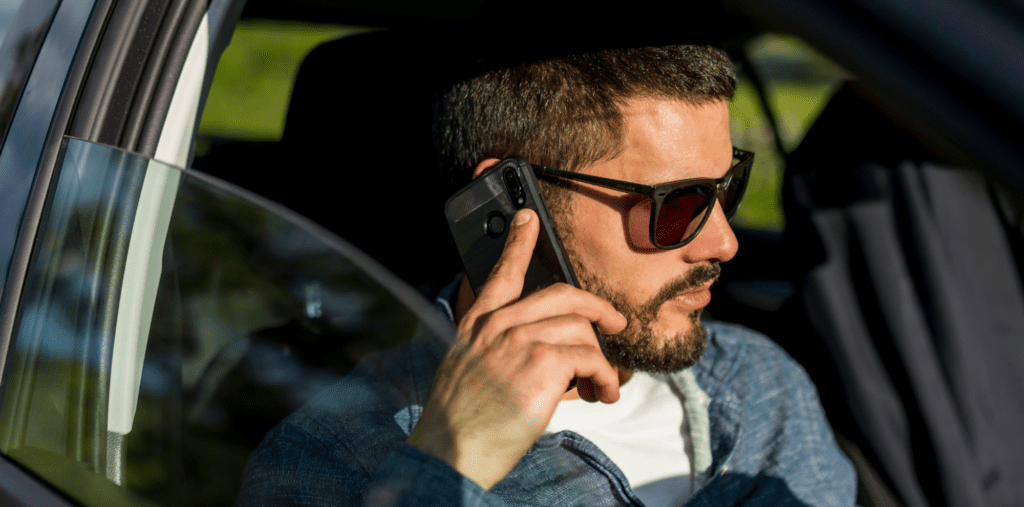
In the intricate dance of day-to-day driving, most of us are well-versed in the cardinal sins of the road: drink driving, speeding, and the ever-present temptation to glance at our mobile phones at a red light.
These are the driving offences we all know to avoid, taught from the moment we first sit behind the wheel and reiterated in every road safety campaign since.
Yet, beneath the surface of these well-publicised no-nos lies a labyrinth of lesser-known laws and regulations, easy to transgress in our daily commutes without a second thought.
Let’s shed some light on these unexpected legal pitfalls, ensuring that your driving practice remains not only safe but squarely within the bounds of the law.
Uncommon Driving Offences
1. Paying with Your Phone at a Drive-Through
It’s a simple act you’ve likely thought nothing of: pulling up to a drive-through window and reaching for your phone to pay.
However, this everyday convenience skirts closer to illegality than you might realise. The crackdown on mobile phone use while driving has intensified, encapsulating even this innocuous act.

The law makes no exceptions for stationary cars in a drive-through lane; if your engine’s running, it’s considered driving.
To avoid falling foul, simply turn off your engine and apply your handbrake before tapping your screen to pay. A small adjustment for the sake of legality.
2. Flashing Your Lights to Give Way
Generosity on the road, particularly in the form of flashing headlights to let another driver merge or turn, feels like a courtesy.
Yet, technically, it strays into the territory of a driving offence. Headlights are designed for visibility, not communication, with the official stance being their use solely to alert others to your presence.
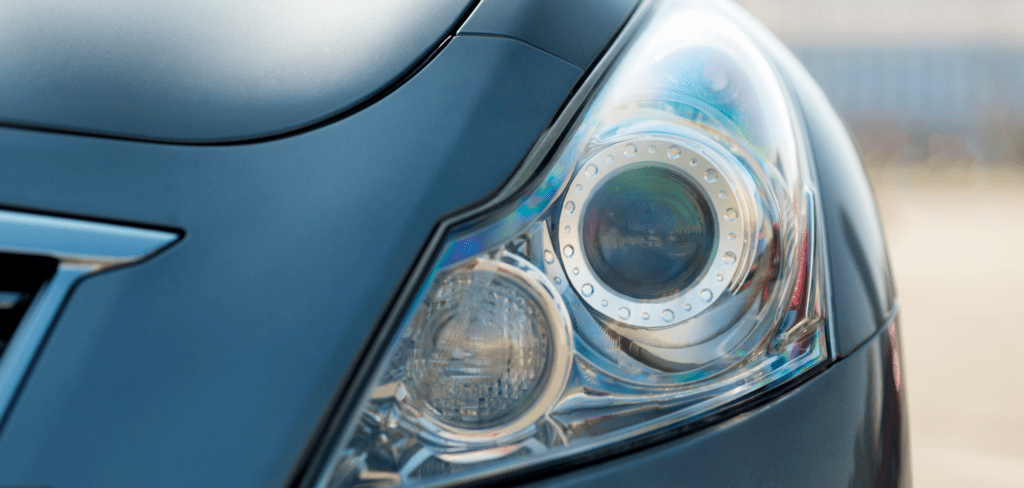
Misinterpretation is a risk the law aims to mitigate; what you intend as a polite “after you,” another could take as a mere illumination adjustment, leading to confusion or accidents.
Keep communications clear and within the bounds of designed vehicle signals to steer clear of a minimum £30 fine.
3. Splashing a Pedestrian with Rainwater
A scenario that might seem more comical mishap than criminal offence, driving through a puddle and splashing a pedestrian, is taken seriously under the Road Traffic Act 1988.
It stipulates driving “without reasonable consideration for other persons,” including splashing pedestrians, as an offence.
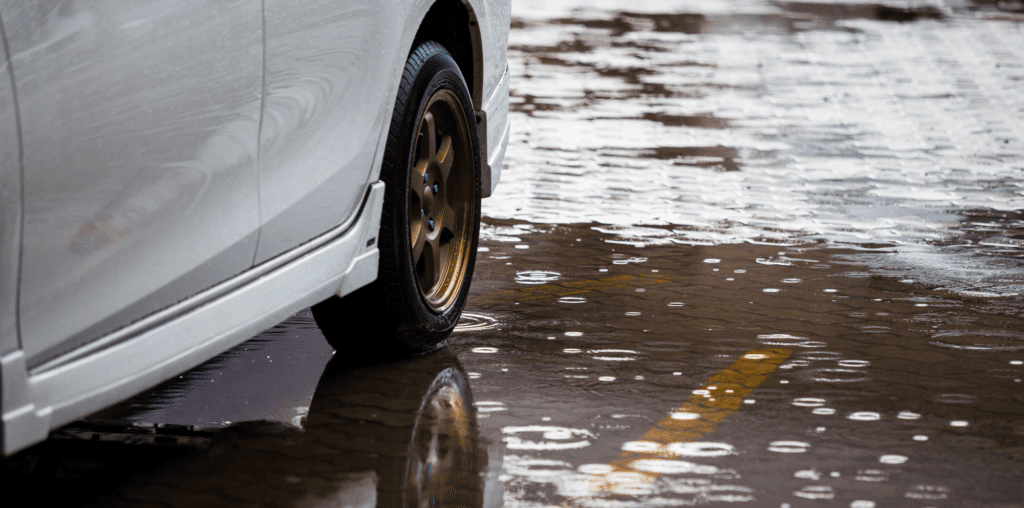
This is about respect and consideration, principles that extend beyond the driver’s seat. In wet conditions, slow down and navigate puddles with care, or you might face fines up to £5,000 for drenching an unsuspecting pedestrian.
The versatility of smartphones has seen them become our go-to for navigation, replacing traditional sat navs for many drivers.
However, there’s a legal caveat: your phone must be mounted in a fixed position to be used legally while driving.
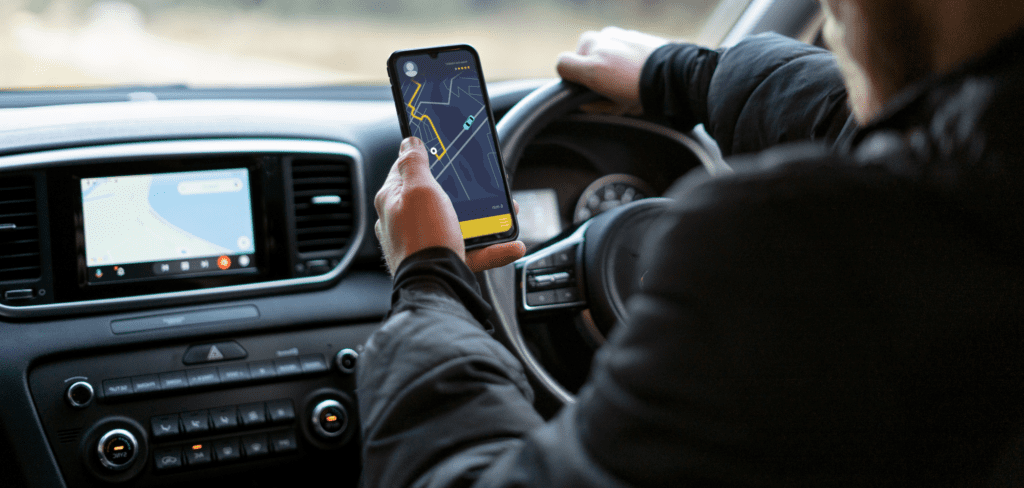
Holding it in your hand or leaving it loose on the passenger seat can result in a £200 fine and 6 points on your license, as it falls under the banner of distracted driving.
Ensure your phone is securely docked within easy sight and reach, keeping your attention on the road and not on steadying your makeshift sat nav.
5. Dirty Number Plate
A simple oversight like a dirty number plate can have surprisingly serious consequences. Legislation demands that your car’s registration plate be legible at all times to ensure vehicles are easily identifiable by law enforcement and traffic cameras.
If mud, road grime, or even a thick layer of dust obscures even one digit of your number plate, you could be liable for a fine of up to £1,000.

Regular checks and cleans are all it takes to keep your plate clear and keep you on the right side of the law.
This isn’t just about cleanliness; it’s a basic but crucial aspect of vehicle maintenance that’s too often overlooked.
6. Parking on the Wrong Side of the Road at Night
Night-time brings a host of additional hazards on the roads, and your parking habits can contribute to these if not carefully considered.
According to Rule 248 of the Highway Code, parking your car facing against the direction of traffic at night is not permitted.
This rule is in place for a couple of critical reasons: firstly, doing so can dazzle oncoming drivers with your headlights as you park or leave.
Secondly, your car’s rear light reflectors are designed to be seen by traffic following you; parked the wrong way, they’re hidden, making your vehicle a potential hazard to other road users.
Ensuring you park in the direction of traffic flow, therefore, isn’t just a matter of convenience, but a significant safety consideration.
7. Towing an Uninsured Vehicle
It’s well understood that driving an uninsured vehicle is a serious offence, but clarity around towing an uninsured vehicle tends to be murkier.
The law is clear: if you’re towing, the towed vehicle must also be insured. The fact it’s not under its power doesn’t exempt it from insurance requirements.
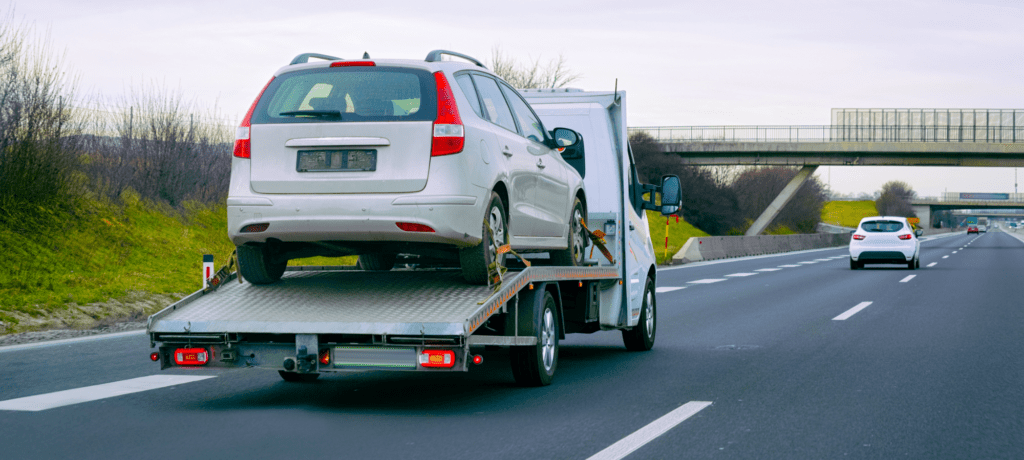
This offence underscores the comprehensive nature of vehicle insurance regulations, which remain applicable regardless of the vehicle’s operational status. Before you tow, verify insurance cover to avoid unexpected penalties.
8. Using the Horn Between 11.30pm and 7am in a Built-up Area
While perhaps considered more a breach of social etiquette than a legal one, using your vehicle’s horn during the night hours (specifically between 11.30pm and 7am) in a built-up area is technically a driving offence.
This law aims to reduce noise pollution and disturbance in residential areas during the hours most people are trying to sleep.
Although the likelihood of being fined for this offence is low, its inclusion in the rulebook serves as a reminder of the importance of consideration for others in our driving practices.
9. Picking Children Up Outside of School
The chaotic scenes of cars jostling for space outside schools at pick-up time are a familiar sight. However, parking too close to a school or in a manner that blocks access for emergency services is a clear offence under Rule 243 of the Highway Code.

Enforcement often utilizes yellow zig-zag lines to indicate no-parking zones, aiming to keep these areas clear for the safety of both children and other road users. Ignoring these restrictions not only poses a danger but also risks fines and penalties.
10. Sleeping in Your Car After a Few Drinks
Opting not to drive after drinking is a responsible choice, but the decision to sleep in your car afterwards could inadvertently land you in legal trouble.
Being in the car with the keys, even if you’re in the backseat and have no intention of driving, can be deemed as being ‘in charge’ of the vehicle while under the influence.

This grey area in the law aims to prevent drunk driving but can catch out those who believe they’re taking a safer option. To avoid this complication, plan alternative arrangements if you’ve been drinking.
Conclusion
The roads are governed by a complex web of rules and regulations, many of which go unnoticed by the average driver.
Understanding these less obvious driving offences is crucial, not only to stay on the right side of the law but to ensure the safety and consideration of all road users.
From the moment you clean your number plate to the decision to pull over and rest, awareness and adherence to these laws contribute to a safer, more harmonious driving environment.
Always remember, when in doubt, err on the side of caution and legality; it’s invariably better to be safe than sorry.


